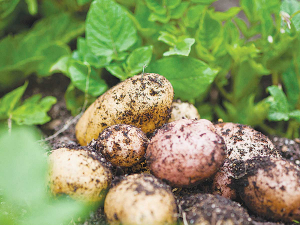'Foodie February' spotlights New Zealand potatoes
This year, 'Foodie February' sees potatoes take the spotlight as one of New Zealand's most powerful and versatile food heroes.
 NZ potato growers aren't giving up their fight against cheaper frozen fries imports from the European Union.
NZ potato growers aren't giving up their fight against cheaper frozen fries imports from the European Union.
Potato growers aren't giving up their fight against cheaper frozen french fries imports from the European Union.
This is despite a Ministry of Business, Innovation and Employment (MBIE) interim report acknowledging the dumping of EU frozen fries in New Zealand, but claiming it's not threatening the local potato industry.
Potatoes New Zealand (PNZ) chief executive Chris Claridge told Rural News that a further submission would be made to MBIE in response to their interim report.
Claridge says PNZ want to ensure that imminent and future material threat is accounted for in the MBIE investigation.
"PNZ contest that the interim findings are not robust enough in terms of imminent and future material threat," he says.
MBIE launched an investigation in August last year after PNZ filed an anti-dumping claim, alleging that dumped frozen potato fries and wedges from Belgium and the Netherlands caused "a threat of material injury" to the domestic industry.
NZ potato growers charged that circumstances arising from the Covid-19 pandemic resulted in reduced demand for frozen potato products globally, with increased inventories in Belgium and the Netherlands.
They claim that available inventories and support being received through government intervention in Belgium and the Netherlands will lead to more Belgium and the Netherlands products arriving into NZ at "dumped prices".</p.
As part of its investigation, MBIE contacted potato processing companies in Belgium and the Netherlands and asked them to fill our a survey.
That information, alongside Customs data, found there was a spike in imports from the two countries in June and July last year - and Dutch company, Lamb Weston, was in fact dumping product here. The MBIE report said dumping was likely to continue but concluded there was not a threat of material injury to the domestic industry as a result.
Accordingly, it was likely that advice to the minister responsible would be to terminate the investigation.
But Claridge says potato growers maintain and the evidence supports that there is dumping.
"PNZ industry and grower members are keen to keep fighting this and are concerned that it's not just the current situation, but how it's going to look in the next few years," says Claridge.
The MBIE report says evidence does not support this claim.
"The evidence does not support the claim by the New Zealand industry that government intervention in Belgium and the Netherlands has assisted potato growers so that producers of frozen potato products can take advantage of lower raw material costs, which means they can reduce prices for exports to New Zealand."
MBIE says based on this there are no grounds to determine that dumping of frozen fries is threatening to cause material injury to the New Zealand industry.
Global trade has been thrown into another bout of uncertainty following the overnight ruling by US Supreme Court, striking down President Donald Trump's decision to impose additional tariffs on trading partners.
Controls on the movement of fruit and vegetables in the Auckland suburb of Mt Roskill have been lifted.
Fonterra farmer shareholders and unit holders are in line for another payment in April.
Farmers are being encouraged to take a closer look at the refrigerants running inside their on-farm systems, as international and domestic pressure continues to build on high global warming potential (GWP) 400-series refrigerants.
As expected, Fonterra has lifted its 2025-26 forecast farmgate milk price mid-point to $9.50/kgMS.
Bovonic says a return on investment study has found its automated mastitis detection technology, QuadSense, is delivering financial, labour, and animal-health benefits on New Zealand dairy farms worth an estimated $29,547 per season.

OPINION: Here w go: the election date is set for November 7 and the politicians are out of the gate…
OPINION: ECan data was released a few days ago showing Canterbury farmers have made “giant strides on environmental performance”.